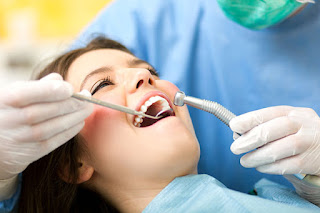As a general dentistry office, we treat patients who are dealing with a wide variety of oral health challenges. We begin by determining what the issue is, treating it, and then discussing ways to prevent the problem from repeating itself. These conversations can be enlightening, and one thing we regularly hear are questions based on dental myths. For example, there is a myth that diet soda is okay for the teeth because it is sugar-free. Patients who are heavy soda drinkers can sometimes be surprised that they have cavities and that their soda habit could have contributed to the problem. Getting accurate information is important to maintain a healthy smile, both now and in the future. For this reason, we have compiled a list of the myths we hear on a regular basis and our response to them.
Myth – Raw diets are good for your teeth.
The truth is that any extreme diet has some drawbacks. The biggest challenge with the raw diet is that much of the food is highly acidic. When acid comes in contact with your teeth, it can begin the process of erosion. You only have a limited amount of enamel on your teeth, so when it starts to erode, your teeth could become sensitive. If you are on the raw diet, be sure to rinse your mouth after eating and drinking, and brush your teeth with a fluoride toothpaste that can help strengthen them. We invite you to visit our general dentistry office any time you are trying a new diet and want to know if it is good for your teeth.
Myth – Adults do not get cavities on a regular basis.
Everyone is susceptible to getting cavities. It does not matter how old you are. If you have teeth, they can experience decay. We encourage all of our patients to have their teeth cleaned at our general dentistry office twice a year, so we can reduce the risk of cavities forming in the first place.
Myth – Flossing is optional.
Flossing is one of the most important things you can do for your oral health, and it is the best thing you can do to prevent gum disease. Every time you eat, food particles can become trapped in between your teeth, and plaque can also build up in these spaces. Flossing allows you to remove food and plaque, preventing it from leading to cavities or from becoming trapped underneath your gum tissue. Leaving it there can lead to inflamed and irritated gums in addition to infections. If you do not like to floss, purchase a flossing tool, since these are easy to hold and make it faster to get the job done.
Myth – Only older people get oral cancer.
This is certainly not the case. While men over the age of fifty are at the greatest risk for developing cancer, anyone can get it. The HPV virus has been known to cause oral cancer, and if you have been diagnosed with it, smoke, drink a lot, or use chewing tobacco, you are at an increased risk. We recommend being screened on an annual basis.
To learn more about oral health or to ask questions, call and schedule an examination.






